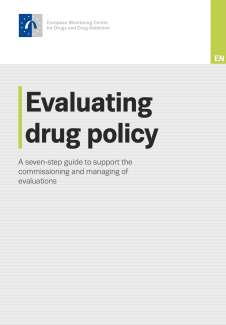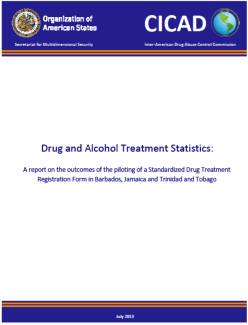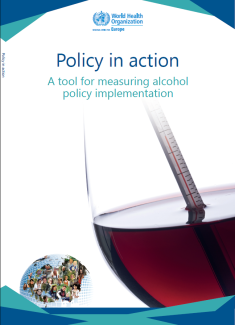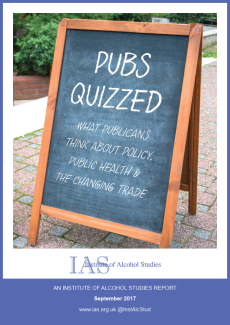
Search
Drug Policy Evaluation
Drug Policy Evaluation: A Seven-Step Guide to Support the Commissioning and Managing of Evaluations is a new resource from the European Monitoring Centre for Drugs and Drug Addiction (EMCDDA). The document addresses the key issues...
Drug and Alcohol Treatment Statistics
Executive Summary
Data collected in drug treatment agencies play a prominent role in informing policy makers. Such data often represent the only information collected regularly and consistently over a certain period of time. What is even...
New National Alcohol Policy launched by Minster of Health
The new National Alcohol Policy for Malawi has been in the making since 2008, a process originally initiated by a group of NGOs. On the 18th of August almost ten years later the Minister of Health, Atupele Muluzi, could launch the final...
Policy in Action: A Tool for Measuring Alcohol Policy Implementation
ABSTRACT
Europe has the highest alcohol consumption and alcohol-attributable disease burden in the world. In 2011, all 53 Member States of the WHO European Region endorsed the European action plan to reduce the harmful use of alcohol...
Awareness of Standardised Tobacco Packaging among Adults and Young People during the Final Phase of Policy Implementation in Great Britain
Abstract
Background: In May 2016, along with the latest European Tobacco Products Directive (TPD), standardised packaging legislation was implemented in the UK. During the following 12-month transition period, both new and old types of...
Pubs Quizzed: What Publicans Think about Policy, Public Health and the Changing Trade
Key Points
- There is significant common ground between public health bodies and publicans, and scope to develop policies approved of by both groups
- Many publicans are deeply concerned about harmful alcohol consumption
- Both...
Barriers to Retention in Methadone Maintenance Therapy among People who Inject Drugs in Bangkok
Abstract
Background
Methadone maintenance therapy (MMT) is a mainstay for treating opioid use disorder and preventing and managing HIV among people who inject drugs (PWID). While previous research suggested low dosing of methadone and...
Energy Drinks, Drug Use and the Developing Brain
New research funded by the National Institute on Drug Abuse (NIDA) has found that university students who regularly consume energy drinks are more likely to develop alcohol use disorders later in life. The same students are also at greater...
Avoidable Emergency Department Visits: A Starting Point
Abstract
Objective
To better characterize and understand the nature of a very conservative definition of ‘avoidable’ emergency department (ED) visits in the United States to provide policy-makers insight into what interventions can...
A Serious Matter: Laughing Gas Prompts Review of UK’s Psychoactive Substances Act
Introduced in 2016, The Psychoactive Substances Act is designed to deal with the influx of new drugs often labelled ‘legal highs’.
The Act bans any substance that "by stimulating or depressing the person’s central nervous system… affects...
Changing Patterns of Substance Misuse in Adult Prisons and Service Responses
Inspection findings were supplemented by fieldwork in eight prisons in 2014 to generate an overall picture of drug use and responses to it in prisons in England and Wales. In the face of rapidly changing and varied drug use patterns, policy...
The Licensing Act (2003): Its Uses and Abuses 10 Years on
Seen as excluding health concerns and requiring an individualistic and ‘premises by premises’ approach, interviews with stakeholders and a revisiting of the 2003 Licensing Act for England and Wales suggest it could nevertheless be used to...
Online Drinking Interventions Shown to be Effective for Armed Service Personnel
Almost two thirds of men in the UK Armed Forces are considered to drink harmful amounts of alcohol.
This is compared with around one third of the average population.
According to a new study published in the Journal of the Royal Army...
Standards of Knowledge for the Science of Prevention
Published by the Society for Prevention Research in 2011, Standards of Knowledge for the Science of Prevention is an important document for those working within substance use prevention.
With the aim of professionalising the field, it...
How to Tackle America’s Opioid Crisis?
Much the result of a poor understanding of how to treat chronic pain, the United States has in recent years been rocked by an unprecedented drug crisis: The opioid epidemic.
Opioids include drugs derived from opium, such as heroin, as...
Drug Misuse and Dependence: UK Guidelines on Clinical Management
There is no more important document for doctors treating problem drug use in the UK than the so-called ‘Orange guidelines’. This major update will substantially inform judgements of what constitutes acceptable medical practice - should...
UK Health Professionals Call for Minimum Unit Pricing of Alcohol in England
Senior health professionals are calling for Westminster to introduce minimum unit pricing of alcohol and clampdown on drinks advertising in England.
They claim that within the next five years up to 63,000 people across the country will...
ISSUP at the 22nd Annual National Institute on Drug Abuse International Forum
Advertising of Tobacco Products at Point of Sale: Who Are More Exposed in Brazil?
Abstract
Objective: To describe the adult population perception of cigarette advertising at point of sale, according to their tobacco use status and socio-demographic characteristics such as sex, age, race/color, region, household...
Physicians’ Views on the Role of Smoking in Smoking-Related Diseases
Abstract
Background
Previous reports have shown that physicians who smoke underestimate the effects of smoking on health and this influences their practice. This study was designed to investigate the views of Estonian physicians on...
Share the Knowledge: ISSUP members can post in the Knowledge Share – Sign in or become a member











